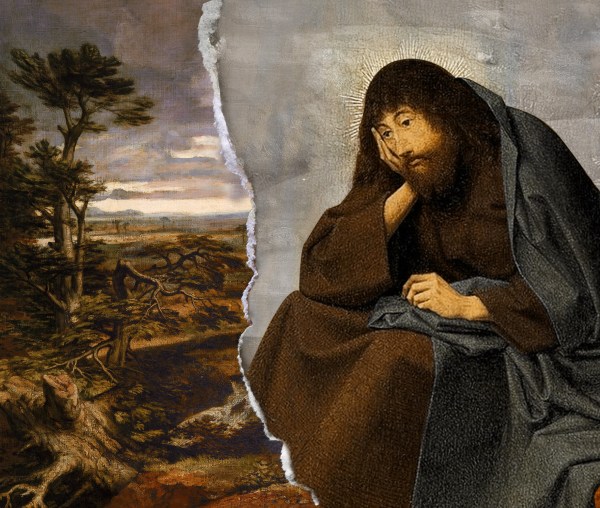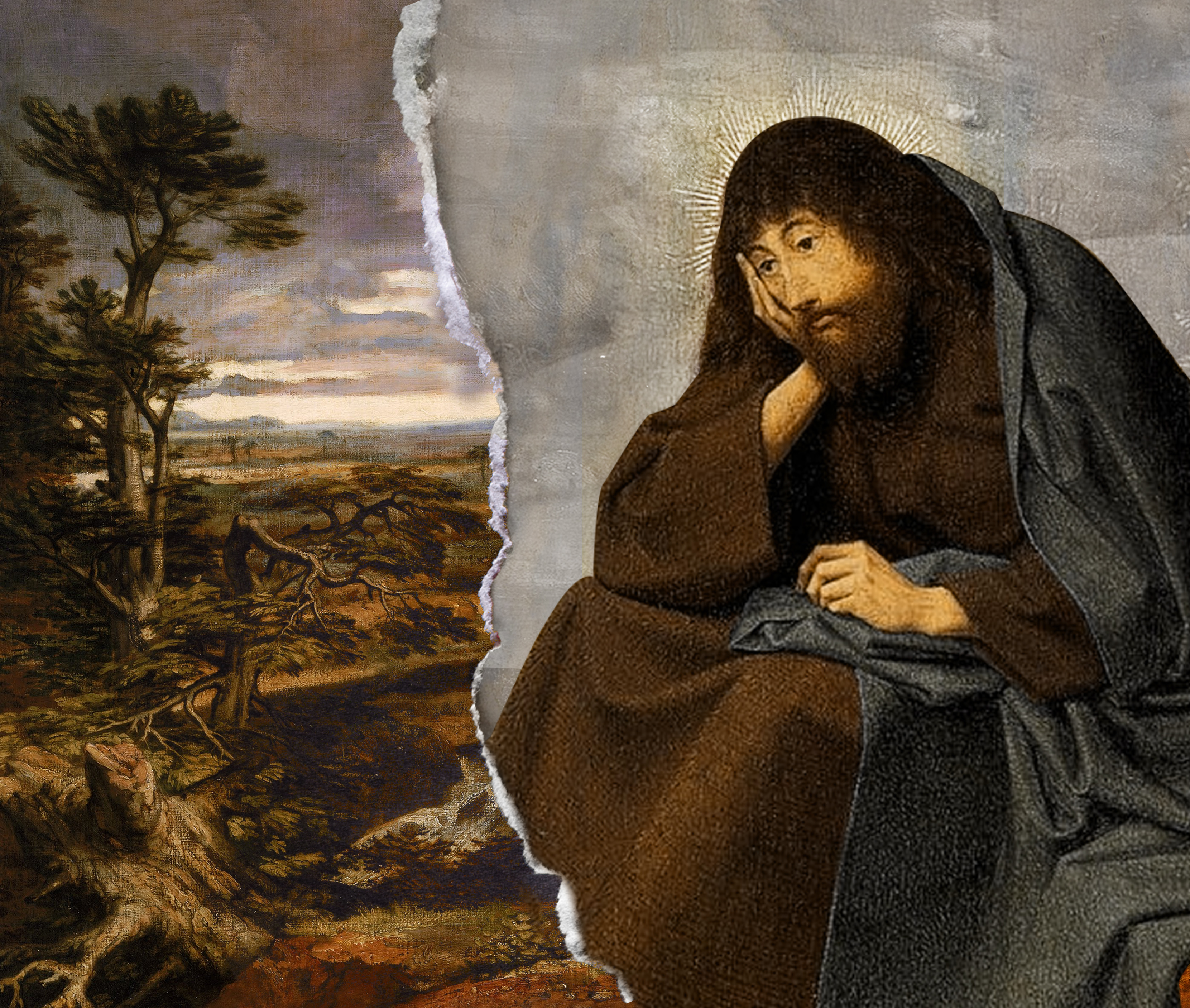At the moments in life when I’m feeling especially scared, I’ve noticed that Elijah is the last person I want to see.
During one dark period, without any conscious decision, I remember altering my daily Bible reading of the Old Testament ever so slightly. I had been reading through 1 and 2 Samuel, then on into 1 Kings through the life of Solomon, when suddenly I veered over to the Psalms. As I thought about it, I became convinced I was avoiding that middle section of 1 and 2 Kings because I knew who was there: a prophet called Elijah. I wanted to avoid him the same way a laid-off person wants to avoid her “Employee of the Month” neighbor or the way an obese person wants to avoid his marathon-running brother-in-law. The comparison only highlights one’s inadequacies, whether real or perceived.
When we think of Elijah, we think of steely determination, the willingness to defy gods and kings, in scorn of the consequences. If you asked me as a child in Sunday school to draw a picture of Elijah, I would have drawn the scene on Mount Carmel, where he calls down fire from heaven. In that moment, Elijah is everything I want to be. He verbally spars with his opponents—sarcastically mocking their impotent god. He confidently pours water on his own sacrifice, he cries out to the skies, and then, with a bolt of incandescence, the fire falls.
That is strong; that is “prophetic.” And so, in moments when courage is lacking, I just want to do an end run around that hair-suited seer. But that’s harder than it may appear. Try to avoid Elijah in moving through the Bible, and one will find, much as King Ahab and Queen Jezebel did, that he has the annoying habit of showing up persistently, often when he is least expected.
That’s somewhat surprising because, at least in terms of space devoted to him, Elijah is not a major biblical figure. As a matter of fact, he is a kind of mayfly in the sunset of the Scriptures; one moment we see him, and the next he is gone in a literal blaze of glory. But Elijah’s absence is felt all over the rest of the Bible, even as his mantle and his spirit move on through the line of prophets. Indeed, the very last words of the Old Testament are about Elijah. As God told the prophet Malachi, “Behold, I will send you Elijah the prophet before the great and awesome day of the Lord comes” (Mal. 4:5, ESV throughout). And then there’s silence for 400 years.
When the story resumes in the New Testament, Elijah is everywhere, in hints and allusions and images. John the Baptist carried out the motif of the wild man of the woods with a word of impending judgment. And Jesus identified this baptizer—his own cousin—with the prophecies of the return of Elijah. At the same time, in his inaugural explanation of his ministry, Jesus pointed to Elijah and his successor Elisha as demonstrating that the good news of God’s kingdom was always meant to overwhelm national and ethnic boundaries (Luke 4:25–27). And, in the Gospels, many aspects of Jesus’ calling evoke scenes from the life of Elijah—from the raising of a widow’s son from death to miraculous provision of food to a visible ascent into heaven.
The real climax point
The Elijah narrative is certainly about courage, but not in the way that I always assumed. That’s because I, like many of us, often misunderstand both the definition of courage and the meaning of Elijah. Much of what I admired about Elijah is not actually the point of the story. I aspire to the sort of fearlessness that could respond right back to Ahab that the king, not the prophet, was the “troubler of Israel” (1 Kings 18:17–18). The same sort of sass and swagger seems present when Elijah threatens drought, holding back rain by his word, and when he challenges the prophets of Baal to their contest on Mount Carmel. He doesn’t just defeat them; he humiliates them. Though they screamed and cut themselves, trying get the attention of Baal, “there was no voice. No one answered; no one paid attention” (v. 29).
Elijah needs no such theatrics. He simply calls for fire, and the fire falls. He was vindicated, uncontestably, as the one who bears real prophetic power.
When it comes to bold and unflinching courage, Mount Carmel is not the hinge point of the Elijah story but a prelude to something else. Right after this moment of triumph, Jezebel—the murderous wife of Ahab—vows to see Elijah dead by the next day. The Bible states, “Then he was afraid, and he arose and ran for his life” (19:3). The story only goes downward from there, as Elijah treks out into the wilderness to flee from this threat.
Far from the flannelgraph Spartacus I have expected since Sunday school, the picture of Elijah in the wilderness is almost pathetic. He is afraid. He is weak to the point of collapse. He is lonely and exhausted. He is questioning his own calling and mission. He seems depressed to the point of, at best, whining and, at worst, self-harm. And even when the crisis is resolved, God speaks to him not of his own bright future but of what God will do through others, rendering Elijah seemingly irrelevant.
Most often, when I have heard this account taught or preached, the focus has been on Elijah facing some form of “burnout.” The application is that human beings must protect ourselves from overextension. We hear practical recommendations drawn from God’s provision for Elijah—proper nutrition, adequate sleep, and time for prayer and reflection. This seems immediately relevant, of course, because many people find themselves in a place of exhaustion, caring for small children, elderly parents, or disabled spouses. Or perhaps they have invested all their identity in a career only to come to midlife and find numbness and disillusion.
But what Elijah was facing in the wilderness was no mere burnout, it seems to me, but something more comprehensive: a breakdown. In the wilderness, God was doing for Elijah what Elijah had done on the mountain—removing the Baals, this time from the prophet’s own heart.
The way of courage, as defined by the gospel, is not the pagan virtue of steeliness and fearlessness, much less our ambient culture’s picture of winning and displaying or strength and swagger. If we misunderstand the true climax point of the Elijah story, we will follow him somewhere other than where he ultimately was led: to the crucified glory of Jesus Christ. We will conclude, mistakenly, that Elijah was the picture of courage we think we need: the ideal celebrated in everything from ancient Greek legends to modern action films to the cavalier confidence we feign in ourselves.
Elijah is not a picture of courage through triumph but of courage through crucifixion. His life was a dramatic enactment, ahead of time, of the Cross—just as your life is a dramatic enactment, after the fact, of that same Cross. That’s why he’s the model we need.
Starkly vulnerable
Consider the way Jesus identifies the “spirit of Elijah” in the life of his cousin, John the baptizer. Like Elijah, John’s ministry is not all boldness and bluster. Yes, John, like Elijah, calls a rebellious people away from their idols to a living God. And yes, like Elijah, he delivers a word of rebuke to a wicked ruler.
 WikiMedia Commons / Illustration by Mallory Rentsch
WikiMedia Commons / Illustration by Mallory RentschBut John is no untouchable hero. Even after baptizing Jesus and hearing God pronounce the Nazarene his beloved Son, John feared he was wrong. From his jail cell, he sent messengers to ask Jesus, “Are you the one who is to come, or shall we look for another?” (Matt. 11:3). A narcissistic cult leader or political guru would be offended by this wobbliness, but Jesus was not. He commended John as the greatest of all the prophets up until that time.
For Jesus, John’s continuity with Elijah was not, as assumed, in his power and confidence but in this weakness and fear. “From the days of John the Baptist until now the kingdom of heaven has suffered violence, and the violent take it by force,” Jesus said. “For all the Prophets and the Law prophesied until John, and if you are willing to accept it, he is Elijah who is to come” (vv. 12–14).
Later, after Elijah appeared on a mountain with Jesus before his disciples, Jesus said that his followers misunderstood what they should expect from Elijah. They were perplexed that, after manifesting briefly, Elijah would go away, leaving Jesus alone—and on his way to crucifixion. They asked why the teachers of the Scripture said that Elijah must return first, before the restoring of all things. Jesus pointed them not to Elijah’s winning argumentation or his miraculous scenes but to his humiliation and suffering. “Elijah does come first to restore all things. And how is it written of the Son of Man that he should suffer many things and be treated with contempt?” Jesus taught. “But I tell you that Elijah has come, and they did to him whatever they pleased, as it is written of him” (Mark 9:12–13).
Indeed, Scripture presents John from start to finish as starkly vulnerable. Even when we do find the fiery prophet we expect, he is essentially exiled from his home and community, eating an unpalatable diet and preaching an even more unpalatable message. Ultimately, of course, we see him as a head on a silver platter. None of this is a deviation from the way of Elijah. It is the way of Elijah. That’s why Jesus, soon after identifying himself with Elijah, was exiled from his community and in danger of an angry hometown crowd throwing him from the precipice of the mountain overlooking his village (Luke 4:28–30).
We can see, then, how the “fire from heaven” Elijah is explained by the “lost in the wilderness” Elijah, not the other way around—just as Christ’s glory is revealed in his crucifixion. The Cross is not a momentary deviation from glory but where we find a glory different from that of the world, different from what we would create for ourselves.
Elijah encounters God at the moment of crisis and collapse. And that’s where he, and we, can find the courage to stand. But even that language of “standing” can deceive us. We talk about standing for what we believe, and by that we typically mean a pose of confidence, like leadership coaches who tell their clients to project strength through body language. What it means to stand for Christ is not, it turns out, to rid ourselves of all fear or to humiliate our enemies with incontrovertible “winning” but instead to live out in our very lives the drama of the Cross. Courage comes not from matching the world’s power and wisdom with more of our own but by being led, like Elijah, where we do not want to go (John 21:18).
The crucifiable self
This sort of courage is formed not only in crisis but also amid the little turning points in life that shape, over time, who we are, what we love, what we fear, and how we stand. These are the moments where things could go one way or the other, and they usually aren’t dramatic and cinematic. Thus, the chief need in every era is not what first leaps to mind when we think of courage—physical bravery—but instead what might be called “moral courage.” Mark Twain once wrote, “It is curious—curious that physical courage should be so common in the world, and moral courage so rare.” Twain was reflecting on a moment of unwillingness to take an unpopular public stance for fear of “saying the disagreeable thing” and being out of step with his peers. That sort of fear, he said, is part of human nature, and he didn’t see it changing.
Scripture gives insight into why moral cowardice is so universal among human beings. Jesus did many signs before the crowds, the apostle John wrote, and yet most of the people did not believe. Quoting the prophetic writings, John said, “Isaiah said these things because he saw his glory and spoke of him,” and yet: “Nevertheless, many even of the authorities believed in him, but for fear of the Pharisees they did not confess it, so that they would not be put out of the synagogue; for they loved the glory that comes from man more than the glory that comes from God” (John 12:41–43).
This is hardly unique to these first-century Jewish people. Everyone, no matter whom or where or when, has similar “Pharisees”—gatekeepers of who is “in” and who is “out.” Everyone fears being cast out of some sort of “synagogue.” For some, it’s a political tribe, a religious group, a generational cohort, or just a sense of being “normal” in the world. We want, if not applause, then at least not rejection and insecurity.
The problem is that much of what Scripture defines as courage—kindness, humility, the bridling of the passions—our culture sees as timidity. Meanwhile, many who feel themselves courageous because they “tell it like it is” are really just playing to their protective tribes. They may believe they “stand” for something, but this is not courage, if courage is defined by Christ. Following him isn’t a matter of taking the correct side of issues and doctrines. It’s about walking alongside him, even when, like Christ’s first followers, we can’t see what’s ahead.
Your courage will not be found in triumphant Mount Carmel moments, when you scatter your enemies, real and imagined. It will be forged, instead, when you cannot stand on your own at all, when you are collapsed in the wild places, maybe even begging for death. Elijah thought he was walking to Mount Sinai, but he was really walking toward Mount Calvary. And so are you. Only the crucifiable self can find the courage to stand.
Russell Moore is president of the Ethics and Religious Liberty Commission of the Southern Baptist Convention. This article is adapted, with permission from the publisher, from his book The Courage to Stand: Facing Your Fear without Losing Your Soul (B&H).











